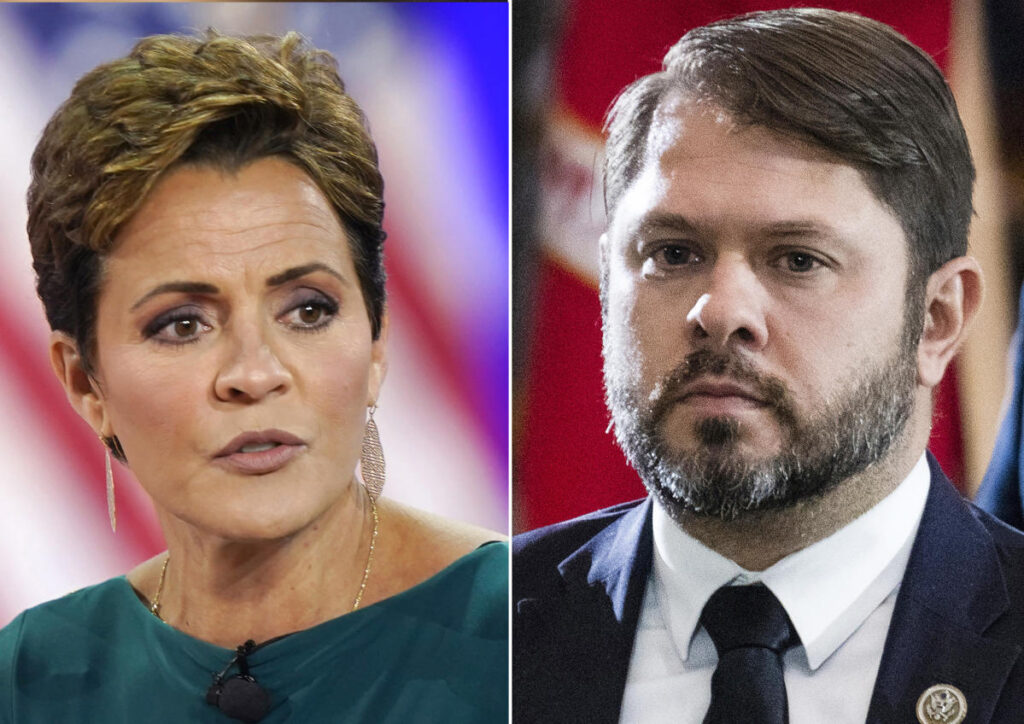The upcoming debate between Democratic Congressman Ruben Gallego and Republican candidate Kari Lake will be a pivotal moment in the Arizona Senate race. Scheduled for Wednesday evening, this debate will occur as early voting begins, setting the stage for a contest that is crucial for determining the balance of power in the U.S. Senate. Lake, who gained prominence as a former television news anchor, has been grappling with her image since her loss in the 2022 governor’s race. Conversely, Gallego, who represents predominantly Latino areas of Phoenix, has utilized his financial resources to promote his military service and compelling personal narrative, potentially overshadowing his more progressive legislative history.
The significance of the debate extends beyond mere candidate introductions, as both individuals aim to appeal to a critical demographic: Republican voters and conservative independents willing to consider crossing party lines. This strategy speaks to the evolving political landscape in Arizona, which has shifted from a strong Republican stronghold to a competitive battleground in recent years. Both candidates are focused on specific issues that resonate with voters in their respective bases; for Gallego, this means emphasizing abortion rights in light of recent Supreme Court decisions, while Lake aims to draw attention to border security concerns.
Kari Lake has positioned herself strongly on issues concerning the U.S.-Mexico border, painting a grim picture of drug and human trafficking to underline stresses faced under the Biden administration. She has been particularly critical of Gallego, linking him to increased border crossings and emphasizing his past remarks that challenge the need for a border wall. Lake’s strategy also involves rallying support among Trump loyalists, with her unwavering allegiance to the former president and his unsubstantiated claims about the 2020 election’s integrity. Lake’s rhetoric not only targets Gallego’s policy positions but also delves into his personal life, raising questions about his past marriage and family dynamics in a bid to undermine his credibility.
On the other hand, Gallego’s profile as a military veteran and his journey from a challenging upbringing to a Harvard education serve as central narratives in his campaign. Raised in Chicago by a single mother, he gained enlistment in the U.S. Marine Corps Reserve, going on to serve in Iraq, an experience that profoundly shaped his identity and approach to political issues. His history as a congressman includes a decade of public service, during which he has honed his advocacy on various key issues. Gallego aims to present himself as relatable and grounded, appealing to voters’ desires for authentic representation, especially in a state with a significant Latino population.
As both candidates prepare for the debate, they are not only contesting for votes but also looking to shape the broader narrative of their campaigns. For Gallego, this is an opportunity to broaden his appeal and clarify his stances on critical issues like abortion rights, particularly if he can effectively frame the discussion in the context of recent legal changes. On the other side, Lake seeks to gain traction in a race where she appears to be trailing, leveraging her ability to personally connect with voters while rallying around issues of law and order, especially regarding immigration and border safety.
The outcome of this debate may influence the trajectory of the race as voters engage with the candidates’ contrasting narratives and key policy proposals. With early voting already underway, the stakes are high for both candidates to secure not just party loyalty but also the crucial swing votes that could determine the winner. As Arizona’s political landscape evolves, the significance of the Senate race underscores broader national trends, and this debate serves as a critical platform for both Gallego and Lake to articulate their vision for Arizona and the future of the U.S. Senate.

